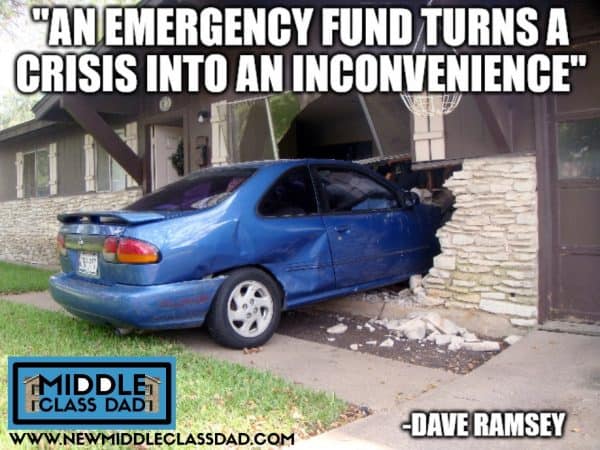
Are you struggling to keep your finances afloat? I struggled with debt and budgeting and financial mess until I started following Dave Ramsey. But what are the seven baby steps from Dave Ramsey?
Here’s the quick rundown.
Dave Ramsey’s Baby Steps are:
- Baby Step 1 – Put $1,000 in a starter Emergency Fund
- Baby Step 2 – Pay off your debts (excluding mortgage) using his Debt Snowball
- Baby Step 3 – Build a full emergency fund of 3 to 6 months of expenses
- Baby Step 4 – Start Investing 15% of household income for retirement
- Baby Step 5 – Start saving for kid’s college
- Baby Step 6 – Pay off your home early
- Baby Step 7 – Build wealth and donate to charity!
Essentially, they are his process to walk through getting out of debt, starting a monthly budget, building an emergency fund, planning for things like kid’s college expense and retirement savings, and building long-term wealth. Quite simply, they work because they get you intentional about how, when, and where you spend your money.
You can do it; I know you can as my wife and I have done it too.
I’m here to help and specifically in this post, we’re going to focus on my personal finance mentor Dave Ramsey. Specifically, we’re going to get into Dave Ramsey’s Baby Steps and why they work.

Who is Dave Ramsey?
Dave Ramsey is probably the #1 personal finance guru in the US; maybe the world.
Above is a shot of my family (minus our latest daughter) with Dave in his studio in Nashville. You’ve likely heard him being interviewed on the top TV shows. Or maybe you’ve heard him on the radio (also released as a podcast).
Perhaps you’ve even read one of his New York Times Best Selling Books such as my favorite, The Total Money Makeover. Just click that link to see it on Amazon and learn more about it.
In many circles, he’s a household name. And only the most sheltered have never heard of Dave Ramsey’s Baby Steps.
And in case you think he’s just another elite offering advice he’s never used himself, he did indeed once file for bankruptcy. He then started his (now thriving) business at a card table in his living room.
In other words, no matter what shape your family’s finances are in now, he’s probably been there (or worse). His advice is solid and I can tell you it works from personal experience.
“I am all for attacking debt like it kicked your mother, but this advice is unrealistic and borderline cruel. You should not shame yourself into being miserable just because you have debt.” @herfirst100K breaking down Dave Ramsey’s money advice is GOODhttps://t.co/4SBZVDxExy pic.twitter.com/9toIS1z53Q
— All-Star Money (@AllStarMoney_) September 15, 2021
How do Dave Ramsey’s Baby Steps work?
Why Dave Ramsey’s Baby Steps work is simple; it gets you to stop making financial decisions emotionally. It also gets you to stop making decisions blindly.
When we just reach for a credit card every time we buy something there’s no emotional connection. After all, unless the card gets declined you don’t likely have any idea what the balance is, how much interest you’ll pay on that purchase, or how long it will take you to pay off.
Well, it’s important to know a few things going in. Things such as:
- It’s important to do them in order
- If you have debt, press pause on things like 401k or other retirement plans and saving for kid’s college
- While you’re getting out of debt, avoid big purchases like cars or lavish vacations
- Don’t prioritize your credit card bills by interest rate; as counter-intuitive as it might seem, follow his debt snowball plan; you will get better traction
That’s why it’s vital that you also incorporate his envelope system into your spending plan.
I break down Dave Ramsey’s envelope system in another post, so check that out for greater detail.
But essentially you take out a set, budgeted amount of cash every payday and divide it up among different envelopes that you and your spouse or partner agree upon. Categories like gas, groceries, family entertainment, and pocket money for you and your spouse.
When the cash is gone, it’s gone until the next payday.
This teaches us discipline, but it also makes us truly value and appreciate the purchases we make. You WILL spend less as every purchase will get scrutinized when you open your wallet and see how much is left.
Dave has an excellent Starter Envelope System on Amazon for less than $20 bucks! So check that out if you’re ready to get started on getting ahead financially!
“We have a retirement crisis in America today nor from a lack of money, but from a lack of vision” ― Dave Ramsey #Quote pic.twitter.com/DHEC4Bmh4K
— David & DanaHagstrom (@WishToRetire) September 15, 2021
How we used Dave Ramsey’s Baby Steps
10 years ago my wife and I had over $60,000 in debt.
Like a lot of Americans we lived in a house we couldn’t afford, drove cars that weren’t paid for and when the money ran out each month we just reached for the credit card and kept going.
But unless you’re the US government, that method just isn’t sustainable.
You can’t borrow your way out of debt or simply hope to hit the lottery and make it all go away. You have to take charge of your life, your money, and your family’s future.
That’s where this post and Dave Ramsey’s Baby Steps come in!
What is Dave Ramsey’s Baby Step 3?
Dave Ramsey’s baby step # 3 is building an emergency fund of 3-6 months of expenses. Note that is not 3-6 months of take-home pay. Err on the 3-month side in a stable 2-income household and on the 6-month side for single and/or erratic income.
The emergency fund is a critical component not many families have. If your air conditioner breaks or your car is totaled in a hit and run, what would you do?
If you’re like many folks, you would just borrow money and not think twice about it. But those expenses can be huge and even those enticing offers of no interest or payments for x number of days come at a price. That price is that we forget about them and then they come knocking for their money sooner or later.
So we start out in Dave Ramsey’s Baby Steps by getting a small amount of $1,000 in a starter emergency fund. This won’t be enough to cover huge expenses, but it gives us a little cushion while we get everything else lined up.
I dive deep into why and how to build your emergency fund in another post, so check that out for much greater detail.
Why does Dave Ramsey give a 3 to 6-month expense range for emergency funds?
The 3-6 month emergency fund range is based on job security and consistency of income. With 2 stable jobs in a household 3 months is sufficient. But for a single income and/or inconsistent income it is better to air on the high side of that 6-month range.
After you’re debt-free you’ll go back to your emergency fund and build it up to between 3 and 6 months of your total household expenses.
Ultimately depending on your expenses we’re likely talking a minimum of $8,000 to $10,000 and might be talking about twice that (or more) for some of you with big costs of living.
It might seem like a lot of money to just park in savings (hint: it’s not an investment so avoid putting in stocks or mutual funds). But this is simply cash you have in a simple savings account that you can access any time you have a large unexpected financial crisis.
Just make sure that a new car, hot tub, or a trip to Disneyland don’t get called “emergencies”.
Why I Gave Up on Dave Ramsey’s #Debt Snowball http://t.co/hzsSsF7p3O pic.twitter.com/R7kJaoW3Ty
— Casey Bond (@CaseyLynnBond) January 5, 2015
What is Dave Ramsey’s snowball method?
Using Dave Ramsey’s debt snowball means prioritizing all debts (excluding the house) from smallest to largest. Pay minimum payments on all but the smallest. Then pay as much as possible on the smallest one until it’s paid off. Then move on to the next one on the list and work up to the biggest debt.
Often those biggest debts are student loans or home equity loans.
Also, forget for the moment that some have higher interest rates than others. Debt is usually incurred emotionally, so we can’t use logic (like targeting the highest interest debts first) to tackle the problem.
All of Dave Ramsey’s Baby Steps are important, but perhaps none are quite as important as getting out of debt.
Debt keeps us prisoner. Even at a low-interest rate we are still giving someone else our hard-earned cash instead of making it work for us in Saving for Retirement.
Dave Ramsey debt snowball form
Dave Ramsey’s debt snowball method for paying off debts has you list out your debts from smallest to largest.
While a form listing out your debts isn’t totally necessary when you could use a simple spreadsheet, you can download a copy of the Dave Ramsey debt snowball form right off Dave’s website.
Why does the debt snowball method work?
The debt snowball method works because when one pays off the smallest debt first, it’s a quick win. And when people experience quick wins it gives them the motivation to keep going.
You see the pile of debt was not accumulated by being calculating and logical. It was acquired by making emotional choices. We spend out of envy or we spend out of frustration. You don’t spend money typically because you analyzed the numbers and it made logical sense.
Thus we can’t dig our way out without getting emotional about it.
Then move on to the next debt and with the first one paid off you’ll be able to pay even more on this one than you did the first. With every debt, you gain more traction as you throw larger and larger payments at them. With every paid bill you get more fired up and feel more successful.
That emotional win will fuel your momentum forward!
“One year ago, we decided we wanted to get more in control of our finances. We read Dave Ramsey’s book ‘The Total Money Makeover’ and decided to follow his 7 Baby Steps. Sticking to a tight budget wasn’t always easy, but we did it together! It feels so good to be FREE! — Whitney pic.twitter.com/KlI5eSRDvQ
— Rachel Cruze (@RachelCruze) April 7, 2021
Why are the 7 baby steps important?
The 7 baby steps from Dave Ramsey are important because they break down an otherwise insurmountable task of paying off large amounts of debt and saving large amounts of money, into small easier to achieve baby steps that are much more likely to be successfully completed.
Think about it.
Almost any goal or dream can seem lofty and unachievable. Want to be President or a famous actor? Well yes, the odds are against you. But if you break either of those down into a small series of steps, you’re much more likely to make it than if you just packed your things and headed for Washington DC or Hollywood without a plan.
Baby steps are just a plan. A roadmap. And more importantly, they are a series of small steps almost anyone can achieve. And you simply go from 1 step to the next until completion.
Can you really live without a mortgage?
Think about what you could do without that mortgage payment!
I don’t know about your house, but at my house, we pay a little over $1,600/month for our mortgage payment (including taxes & insurance).
Thus if my wife and I paid off our mortgage that would give us an extra $10,000 a year (since we still have to keep paying taxes & insurance).
We’re not retiring to the Caymans on that, but it’s also nothing to sneeze at. Over 10 years just in a savings account that would grow to $100,000.
Are the Dave Ramsey baby steps out of touch with today’s world? Ramsey the financial guru is a controversial topic in some circles. https://t.co/aH1QN7nQGw via @debtdiscipline pic.twitter.com/tfL1KkGuOI
— Brian (@FinLitBrian) May 5, 2020
How does compound interest work?
But what if you invested that $10,000 savings in a good mutual fund with a 10 or more year track record of 10% (or better) growth?
Using a compound interest calculator courtesy of MoneyChimp, I see I could easily grow that $10,000/year to upwards of $175,000 in a ten-year period. Leave it for 30 years and it grows to $1,809,000! Now that is something worth doing!
So once you’re debt-free, saving for retirement and college, throw everything else extra at your mortgage payment.
Living and Giving like no one else!
So when you get to this last stage of Dave Ramsey’s Baby Steps, you know you’ve made it!
This is where you’re doing so well financially that you can, as Dave says, “live and give like no one else”. That simply means you’re on such solid ground you can travel and give to family members and charity.
Basically, you’d be living my dream life! So let’s get there together!
Why budgeting is important
Are you struggling each month to pay bills? Maybe you’re behind on bills or have more bills than you do income.
You’re left wondering where your money went each month instead of telling your dollars where to go?
I get it! That’s why a cornerstone of Dave Ramsey’s Baby Steps is to do a written budget every month before the month begins.
It’s OK if (assuming you’re married or in a serious relationship) one of you is more the math nerd than the other. But you both need to agree on the big picture, amounts and spending categories.
You’ll almost never get ahead by just winging it, so get intentional with your money and show it who’s boss!
Want the best budgeting tool out there? Download my FREE Excel household budget template now!

Once you get it, you can dive deep into how to use it and why it works in another post about why this is the Best Excel Household Budget Template.
Why should you follow Dave Ramsey’s Baby Steps?
You should follow Dave Ramsey’s Baby Steps because they work. They take an otherwise daunting and seemingly unachievable goal and break them down into a series of small digestible steps which most people can easily accomplish.
They worked for my family and they can work for yours too.
As I mentioned at the top of the post, almost a decade ago my family was in bad financial shape. Following Dave Ramsey’s Baby Steps we paid off over $60,000 in debt, paid off our cars, sold our house we couldn’t afford and got our life back on track.
We also got our marriage back on track!
After all, money fights and money problems are among the Top Reasons for Divorce. So getting your finances in order and uniting with your spouse behind that goal is a great way to make your relationship and family stronger.
But don’t take my word for it!
According to Dave Ramsey:
- He has had more than 4.5 million people have participated in his Financial Peace University
- More than 13 million people listen weekly to The Dave Ramsey Show
- He’s sold more than 10 million books sold combined
In other words, Dave Ramsey’s Baby Steps have helped millions of people get their life back.
Will you be next?
Dave Ramsey’s Baby Steps and Why They Work https://t.co/3s31aPgSGt pic.twitter.com/N85thz3HLw
— Well Kept Wallet (@WellKeptWallet) November 14, 2018
So what are my . . .
9 Proven Reasons You Should Follow Dave Ramsey’s Baby Steps?
1. YOU NEED A PLAN
You have to be intentional with your life, your spending, and your money. While just doing what you want when you want as a 5-year-old might work for a little while, it’s not sustainable for the long term.
Dave Ramsey’s Baby Steps give you an incredibly specific plan and it can work for you if you follow it.
2. YOU CAN’T BORROW YOUR WAY OUT OF DEBT
We’ve all met people with car loans, boat loans, student loans, and a half dozen credit cards. From a distance, they look like they are living life to the max. But behind the curtain, you see the wizard has a lot of bills.
According to the Motley Fool, the average American owes upwards of $140,000 on loans and only earns an average of $59,000/year.
Even without a calculator, you can see how that math just doesn’t work.
3. OVER 13 MILLION PEOPLE CAN’T BE WRONG!
Between his radio show, podcast, and Financial Peace University students, Dave Ramsey’s Baby Steps have helped over 13 million people get out of debt and get their lives back on track.
And that’s not even counting book sales, word of mouth, and people who just find him via blogs like this one.
4. HIS PLAN WORKS IF YOU FOLLOW IT
I have worked on Dave’s plan for upwards of 10 years and my family is far better off for it. We hit a few speed bumps, paid, as Dave says, some “stupid tax” (money we didn’t need to spend because we made a mistake).
But his plan can work for anyone if you follow it. Just stick to it, make sure you and your spouse are in agreement, get aggressive enough to see traction so you don’t lose motivation and you’ll get there.
5. YOU CAN’T AFFORD NOT TO!
As I mentioned with the above stats, the average American has about 3 times their annual income in debt. Most of us will never win the lottery or get that inheritance from the rich Uncle you didn’t know you had.
Thus if you’re going to succeed in life you can’t count on anyone to make it happen for you; you have to make it happen!
6. IT JUST MIGHT SAVE YOUR MARRIAGE!
I mentioned it above, but money fights and money problems are often in the top 3 of the reasons for divorce. If your family was anything like mine 10 years ago, you could easily find your marriage strained and communication poor.
If your marriage is already challenged I have a completely FREE 6 part mini-course to strengthen your marriage.
No strings attached, so if you’re interested, check out my Rock Your Marriage mini-course at no cost!
Clean up your finances and watch your relationship improve!
7. TO CHANGE YOUR LIFE YOU MUST CHANGE YOUR HABITS
Financial messes often take time to create. Maybe it started with that 1 credit card in college. Then your friends all started getting new cars and you felt left out. Fast forward a decade and maybe you’re married with 2 car loans, student loans, and several credit cards in a house on an adjustable-rate mortgage.
Guess what? You’re normal!
But normal isn’t where you want to be. If you want to change your life, you have to be willing to change the habits that got you there. You have to be willing to be weird.
8. YOUR KIDS ARE COUNTING ON IT!
As parents, we naturally want to set our kids up for success in life! We parent them, teach them, train them.
But you know how they learn the most? From watching what we do! If you smoke, guess what they’re more likely to do?
The same is true with finances. Growing up, I learned very little about finances. In fact, I had to learn the hard way how to do things correctly. Dave Ramsey’s Baby Steps were a big part of that.
But the best legacy I can leave my kids, outside of an actual financial nest egg and paid-for college is the knowledge and wisdom I’ve learned from doing things the right way.
9. BECAUSE YOU WON’T WANT TO BE OLD AND BROKE!
I don’t know about you, but I don’t want to be old and broke. I also don’t want to count on social security to live on.
According to a recent study by the Economic Policy Institute, the average retirement savings in America is just under $100,000.
That might sound like a lot of money. But if you retire at 67 and live until 85 and maybe your spouse outlives you by 5 years that means you’re trying to stretch that $100k out about 20 years.
That amounts to $5,000/year. Can you live on that? I didn’t think so! So let’s get on track with Dave Ramsey’s Baby Steps!
Do you have questions about Dave Ramsey’s Baby Steps?
In this post, we took an in-depth look at the cornerstone of Dave Ramsey’s financial planning advice; his baby steps!
Specifically, we broke down all of Dave Ramsey’s baby steps. We looked at how they work, why they work, but most importantly, how to implement them into your life today, for a better financial tomorrow.
Which baby step are you on?
While I have years of successful financial & budgeting experience and run several million-dollar businesses and handled the accounting, P&L and been responsible for the financial assets of them, I am not an accountant or CPA. Like all my posts, my posts are opinions based on experience, observations, research, and mistakes. While I believe all my personal finance posts to be thorough, accurate, and well-researched, if you need financial advice, you should seek out a qualified professional in your area.
As an Amazon Associate I may earn a small comission from qualifying purchases if you click to Amazon from my site and choose to make a purchase. You can read my complete affiliate disclosure for more details.
Image by Laura Retyi from Pixabay


